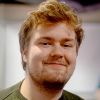
Harry MullineauxSanders
- Course: Theoretical Physics MPhys
Harry had always loved maths but wanted to study something with more real-world applications. He decided not to go down the pure maths route because he felt it was too abstract and detached from the real world for his taste. Theoretical physics was a nice balance between studying the abstract structures that underpin the reality and applying those ideas to study the resultant phenomena.
“I came to an open day and was impressed that I could immediately specialise. I knew that I was more interested in theoretical physics compared to experimental. The fact that I was only required to take labs during my first year and could take pure mathematics modules appealed to me as I could focus my time on areas that interested me.”
Exciting opportunities to learn
Harry is currently doing his Master’s research project with Professor Jiannis Pachos in Quantum Many Body Physics. “I am studying a Buckminster Fullerene lattice of spin-1/2 particles. Systems like these can possess types of particles called anyons which are effectively two-dimensional. They have more complicated physics than standard particles and can be used for naturally error-resistant quantum computing, so contributing to this field is incredibly exciting. It is a system that has not been previously studied, which has been quite daunting but is very rewarding when I have found results.”
As part of the theory course, Harry was also encouraged to take courses from outside the department in the School of Mathematics. These modules are very different to physics ones and focus on very different ideas. The lecturers spend most of the time studying the structure and properties of mathematical constructs rather than focusing on using the ideas to solve problems, which can be very interesting. It also really helps in physics lectures where it’s easier to develop a deeper understanding of the content with a background in mathematics.
His advice to new students “Give everything a go, try as many different modules and areas of physics, maths and computing as possible and you’ll find something you like.”
What next?
Harry wants to stay in research and take a PhD, most likely in Quantum Matter. He is in the process of applying for PhD projects and waiting to hear back about his applications. Before doing a PhD, he intends to take the Part III Maths course at Cambridge and already has a conditional offer.
For now, Harry is a firm believer that his experiences at Leeds have broadened his academic horizons as he explains: “I was able to get involved and hear about the cutting-edge research being conducted at Leeds and the rest of the world. I did this by attending weekly seminars conducted by the Theoretical Physics Group which allowed me to hear about the current forefronts of research and find out about areas of physics I did not previously know existed as well as getting to chat to academics about their work.”

